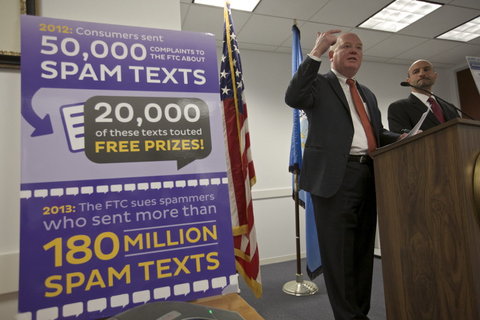 John Gress for The New York Times Federal Trade Commission officials at a recent news conference about spam texts.
John Gress for The New York Times Federal Trade Commission officials at a recent news conference about spam texts.
I haven’t lived in Atlanta for several years. But my cellphone, which still has an Atlanta phone number, apparently maintains a very active social life there. Every weekend it gets invitations to wild parties throughout the city, including a hip place called “The Mansion Elan.”
Here’s last Friday’s promo: “#1 Party in ATL #MansionElan TONIGHT!! [18+] EVERYBODY FREE ALL NIGHT!! FREE DRINKS TIL 12 Are you coming?”
Shortly afterward, another party center, Obsessions, chimed in, apparently from the same number. “College Ids free all night Long last week was crazy Are u coming?”
These were followed by an invitation to “Metro Lanes,” apparently a bowling alley and roller skating place that sounds downright retro. “U Comin,” was the only exhortation.
No, I’m not. And you probably don’t really want me to, anyway.
A video on the Mansion Elan’s Web site mostly shows attractive, young people dancing and drinking with abandon. I’m a mostly unhip working parent who writes about personal finance from the hinterlands. Even if I still lived in Atlanta, I would be fast asleep by the time things got rolling at these places. So not only are the texts annoying, they make me feel old and boring. They ding my phone, making me think I have an important message — from my husband, a friend or, more likely, my child’s dentist. But, no. It’s only another invitation.
The Federal Trade Commission is supposedly cracking down on text spammers. The commission recently filed suit in eight courts to stop mass texts about fraudulent gift cards. The Mansion Elan is an actual location. It is not trying to trick me into anything, except a night out followed by a hangover. But that does not make it any less annoying.
When I tried calling the number on the text message, it said the voice mail account on the number had not been set up. (Go figure.) So I searched online and found the Mansion Elan’s Web site, which included a phone number. I called and a voice menu directed me to leave a message for the general manager. So I did, requesting that the Mansion Elan stop texting me. (I didn’t say I was a reporter.) So far I have not heard back.
A year or so ago, when I first started getting these texts, I put a block on the number through Verizon, my cellular carrier. That worked — for a while. But the block expired after six months. If I want the option to block specific numbers permanently, I have to pay an extra $4.99 a month, according to Verizon’s Web site.
I think my cellphone bill is high enough already, so I went online again to put another temporary block on the number. Of course I had forgotten my user ID and password, and the system would not accept the answer to my “secret question,” even though I’m pretty sure the name of my first elementary school has not changed. So I had to take another 10 minutes or so to reset my credentials and log on.
By the time I was finished, I was thoroughly annoyed with both Verizon and the Mansion Elan. But at least I’m free of the regular reminders about my dull nightlife — for the next six months, at least.
Have you received spam texts? How did you handle them?
Article source: http://bucks.blogs.nytimes.com/2013/03/19/spam-texts-vex-me-and-make-me-feel-old/?partner=rss&emc=rss